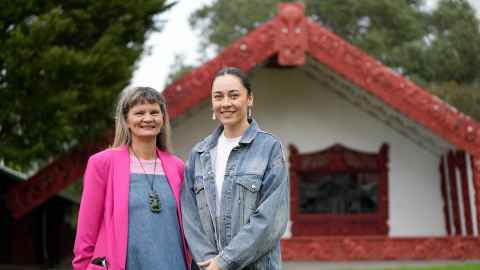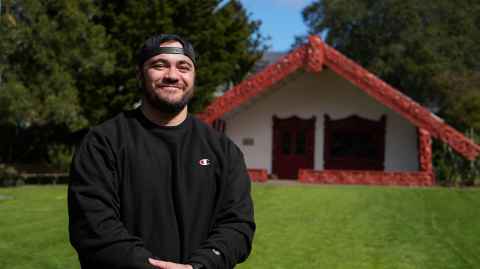Enhancing rangatahi well-being through Mātauranga Māori
1 September 2024
Clinical psychology researchers aim to enhance services for rangatahi who engage in self-harm, through a kaupapa Māori approach.

Trigger warning: suicide and self-harm
Waipapa Taumata Rau, University of Auckland, is at the forefront of a Mātauranga Māori research initiative aimed at preventing self-harm among rangatahi Māori.
Clinical psychology researchers Heemi Kapa-Kingi (Te Aupōuri, Ngāpuhi, Waikato, Te Whānau-a-Apanui) and Kiani Stevenson (Ngāpuhi, Saoluafata, Palauli) are pioneering a kaupapa Māori approach that seeks to empower whānau and improve outcomes for young Māori.
Guided by Dr Tania Cargo (Ngāti Manu, Ngāti Maru, Ngāpuhi), a senior lecturer in the Faculty of Science, the research focuses on the Northland region of Aotearoa New Zealand and the team will soon be opening wānanga in Kaitaia and Whāngarei.
The wānanga will offer a culturally grounded space for whānau and rangatahi to engage and share their experiences.
Research has shown that current suicide and self-harm prevention services can fall short in meeting the cultural needs of Māori whānau.
"One aspect we discovered in this research is that whānau often had negative experiences with mental health services, which discouraged them from seeking further support," says Kapa-Kingi.
"A lack of cultural support and understanding also made interactions with the health service triage more difficult."

A community-based approach
The research aims to change this narrative by creating a resource centring on the voices and experiences of whānau and rangatahi.
Kapa-Kingi’s role involves conducting wānanga with whānau and caregivers of rangatahi who have overcome self-harm, aiming to understand what supports would help.
These whānau and rangatahi will co-design resources tailored specifically to the needs of Māori whānau.
"What stands out for me was the under-researched nature of self-harm and how whānau who support rangatahi often feel ill-equipped to manage these situations, making the development of our resource essential," Kapa-Kingi adds.
Stevenson, who is focused on exploring the multifaceted nature of self-harm and the distress faced by rangatahi, describes the collaboration with the community as a privilege.
"It’s an honour to share space with whānau who have trusted us with their stories. These are stories we hold close to our hearts and hope to provide a voice for."
There is currently little knowledge about self-harm and a lack of resources to support whānau Māori, who are often the first responders for their rangatahi.
After the wānanga, the next step in the research involves the creation of a resource specifically co-designed with whānau.
"Unlike existing Tangata Tiriti resources, which often do not align with the cultural realities of Māori, this resource will be shaped by the voices and needs of the community.
“A kaupapa Māori resource provides valuable knowledge about the support needs of rangatahi and whānau and shines a light on Māori experiences of self-harm within an Aotearoa context,” says Stevenson.
“For our research to be truly tailored for whānau, it’s critical we hear from them directly to determine the necessary resources and what they need.”
Wānanga details
Wānanga will be held in Kaitaia on 14 September and Whangārei on 15 September. To find out more or to register your interest, click here.
Media contact
Te Rina Triponel | Kaitohutohu Pāpāho Māori
te.rina.triponel@auckland.ac.nz